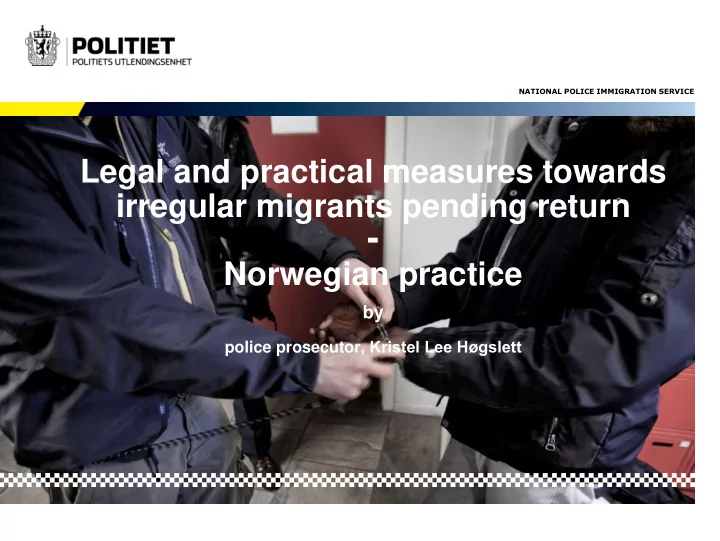

NATIONAL POLICE IMMIGRATION SERVICE Legal and practical measures towards irregular migrants pending return - Norwegian practice by police prosecutor , Kristel Lee Høgslett
NATIONAL POLICE IMMIGRATION SERVICE Police – role of immigration authority and front line support • Preliminary registration, visitation and ID examination Any asylumseeker in possession of passport/travel document are obliged to hand it in to o the police. Mandatory to all foreign nationals to contribute to clarify ones own identity in order to o establish correct identity, upon entry and until correct identity is registered, cf. Immigration act, section 83, administrative regulations section 17-7. Access to administrative, criminal and intelligence information systems (on national and o european level, e.g. Eurodac, SIS, VIS). Exchanging intelligence and sensitive information with other parts of law enforcement. o Use of coercive measures to establish correct identity, e.g. search and seize documents, o cell phones, other material that provide information, fingerprints taken by force, etc. Fingerprint and photo registration as a routine. o 28.03.2017 • Side 2
NATIONAL POLICE IMMIGRATION SERVICE • Prosepective legal amendments o Authorization to conduct thorough visitation in conjunction with registration of asylum applications. o Multiple purposes for visitation: establish correct identity, travel routes, grounds for protection or exclusion of refugee status, unveil information about human trafficking/smuggling or security threats. o Visitation includes excamination of cell phones, lap tops, ipads, or other electronic storage units, thus, enabling the police to compare information and reveal corrolations that may determine correct identity, e.g. pictures, contact list, phone records, written language. 28.03.2017 • Side 3
NATIONAL POLICE IMMIGRATION SERVICE Pending decision in asylum cases • Obligation to contribute to clarify ones own identity runs throughout the case process, even if residence permit is granted, if imposed by immigration authorities. • Coercive measures are applicable even prior to the decision, if certain conditions are met, e.g. non-compliance with legal obligations and unwilling to co-operate to clarify correct identity, or there are grounds to believe that the foreign national have presented a false identity. • Search and seizure, but no access to conduct search at third party or order compulsory disclosure, e.g. financial institutions hold passports copies. • Apprehension and detention – police administrate a national detention center • Collect information from open internet sources, e.g. social media. • Register new information consequtively in both criminal and administrative information systems, e.g. identity presented during trial. • Raise awareness within (local) law enforcement agencies – identity examination and field of immigration are integrated parts of police responsabilities. 28.03.2017 • Side 4
NATIONAL POLICE IMMIGRATION SERVICE Pending return or removal • Information collected throughout the process is vital. • Use of coercive measures only if necessary and no alternatives are applicable. • But during detention: examine the detainee, his/her cell, property and other items kept at the detention center. Limit and control detainee's right to phone calls, recieve mail or visitors e.g. to prevent tampering with evidence or plan an escape. • Challenges with prolonged detention, resource-demanding. • The effectiveness of coercive measures is closely connected with return possibilities • Return agreements, as long as they are enforced! • Establish close and operational relations with embassies. • Use of Norwegian liaisons and special envoys at local embassies. • Exchange information, practice and experience with other Schengen-states. • Political and diplomatic involvement/intervention. • Challenge that some states require voluntariness and willingness from the migrant to return, even after citizenship has been verified 28.03.2017 • Side 5
Recommend
More recommend